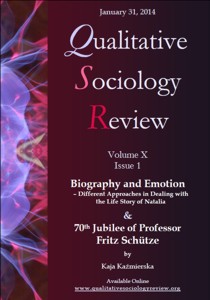A Social Work Perspective on the Biographical Research Interview with Natalia
DOI:
https://doi.org/10.18778/1733-8077.10.1.06Keywords:
Social Work, Biography, Strengths, Interaction, Ethics, InterviewAbstract
Biographical interviewing is used not only in research but also in clinical work such as social work practice. However, as social work settings differ from research settings, the ways of doing, analyzing, and using biographical interviews will differ. The differences arise from the reasons for and the purposes of the interview, the institutional context, the relationship between interviewer and interviewee, interviewees’ capacity for storytelling and reflective work, time limits, the structure of the biographical interview, and follow-up interviewing. In social work, interviewees are in a more vulnerable position than in research, and there is a stronger power imbalance. The service users’ expectations are essential for the work, and it is important that the users articulate their expectations because the purpose of social work is to change and improve the life situation of service users. This asks for ethical considerations that are partly different from those necessary in research.
The biographical interview with Natalia is here analyzed using the strengths perspective as the social work theoretical framework. The analysis shows that in her present life Natalia has many strengths and resources, which, in a social work situation, could be mobilized to support her in getting more control over her life. Her perceived strengths are: her capacity for storytelling and reflection; her emotional and cognitive capacities; her willpower; and her capacity for enjoying her present life and planning for her future. Resources identified are: her significant others; her economic situation; her satisfying job situation; her capacity to have dreams for the future; and her religion. Implications for social work, both in the past and in the present, are discussed.
Downloads
References
Barker, Richard. 2009. “Some Reflections on Developing the Use of Biographical Interviewing in Counselling Practice as part of Occupational Rehabilitation.” European Studies on Inequalities and Social Cohesion 3-4/2008:112-122.
Google Scholar
Björkenheim, Johanna and Synnöve Karvinen-Niinikoski. 2009a. “Social Constraints and the Free Will – Life Course and Vocational Career.” European Studies on Inequalities and Social Cohesion 1-2/2008:103-112.
Google Scholar
Björkenheim, Johanna and Synnöve Karvinen-Niinikoski. 2009b. “Biography, Narrative, and Rehabilitation.” European Studies on Inequalities and Social Cohesion 1-2/2008:113-127.
Google Scholar
Björkenheim, Johanna, Johanna Levälahti, and Synnöve Karvinen-Niinikoski. 2009. “Social Work Case Analysis of Biographical Processes.” European Studies on Inequalities and Social Cohesion 3-4/2008:123-146.
Google Scholar
Björkenheim, Johanna. 2010. “A Biographical Approach for Social Work?” Conference paper presented at the European Social Science History Conference in Ghent, Belgium. April 16.
Google Scholar
Bornat, Joanna and Jan Walmsley. 2004. “Biography as empowering practice: lessons from research.” Pp. 221-236 in Biographical Methods and Professional Practice, edited by P. Chamberlayne, J. Bornat, U. Apitzsch. Bristol: The Policy Press.
Google Scholar
DOI: https://doi.org/10.46692/9781847425874.015
Cowger, Charles D. and Carol A. Snively. 2002. “Assessing Client Strengths. Individual, Family, and Community Empowerment.” Pp. 106-123 in The Strengths Perspective in Social Work Practice, edited by D. Saleebey. 3rd ed. New York: Longman.
Google Scholar
European Studies on Inequalities and Social Cohesion 1-2/2008 and 3-4/2008. Łódź University Press. 2009.
Google Scholar
Gray, Mel. 2011. “Back to Basics: A Critique of the Strengths Perspective in Social Work.” Families in Society: The Journal of Contemporary Social Service 92(1):5-11.
Google Scholar
DOI: https://doi.org/10.1606/1044-3894.4054
Hornung, Ela. 2010. ”Die Rede des Anderen. Narrative Interviews versus psychoanalytische Interviews. Überlegungen zum Setting.” BIOS 23(1):127-137.
Google Scholar
IFSW. 2012. Definition of Social Work. [Adopted by the International Federation of Social Workers’ General Meeting in Montréal, Canada, July 2000.] Retrieved October 19, 2012 http://ifsw.org/policies/definition-of-social-work/
Google Scholar
Kaźmierska, Kaja. 2004. “Ethical aspects of biographical interviewing and analysis.” Pp. 181-191 in Biographical Methods and Professional Practice, edited by P. Chamberlayne, J. Bornat, U. Apitzsch. Bristol: The Policy Press.
Google Scholar
DOI: https://doi.org/10.1332/policypress/9781861344939.003.0012
Lillrank, Annika. 2012. “Managing the interviewer Self.” Pp. 281-294 in The Sage Handbook of Interview Research, edited by J. F. Gubrium et al. 2nd ed. Los Angeles: Sage.
Google Scholar
DOI: https://doi.org/10.4135/9781452218403.n20
Payne, Malcolm. 2005. Modern Social Work Theory. 3rd ed. Basingstoke, New York: Palgrave Macmillan.
Google Scholar
Richard, Wendy. 2004. “The biographical turn in health studies.” Pp. 165-180 in Biographical Methods and Professional Practice, edited by P. Chamberlayne, J. Bornat, U. Apitzsch. Bristol: The Policy Press.
Google Scholar
DOI: https://doi.org/10.46692/9781847425874.011
Rosenthal, Gabriele. 2003. “The Healing Effects of Storytelling: On the Conditions of Curative Storytelling in the Context of Research and Counseling.” Qualitative Inquiry 9(6):915-933.
Google Scholar
DOI: https://doi.org/10.1177/1077800403254888
Saleebey, Dennis, (ed.). 1997. “The Strengths Perspective: Possibilities and Problems.” Pp. 231-245 in The Strengths Perspective in Social Work Practice. New York: Longman.
Google Scholar
Schütze, Fritz. 2009. “Biography Analysis on the Empirical Base of Autobiographical Narratives: How to Analyze Autobiographical Narrative Interviews – Part Two.” European Studies on inequalities and social cohesion 3-4/2008:5-77.
Google Scholar
Shaw, Ian. 2008. “Ethics and the Practice of Qualitative Research.” Qualitative Social Work 7(4):400-414.
Google Scholar
DOI: https://doi.org/10.1177/1473325008097137
Wilson, Kate et al. 2011. Social Work. An introduction to contemporary practice. 2nd edition. Harlow: Pearson Education.
Google Scholar
Downloads
Published
How to Cite
Issue
Section
License

This work is licensed under a Creative Commons Attribution-NonCommercial-NoDerivatives 4.0 International License.











